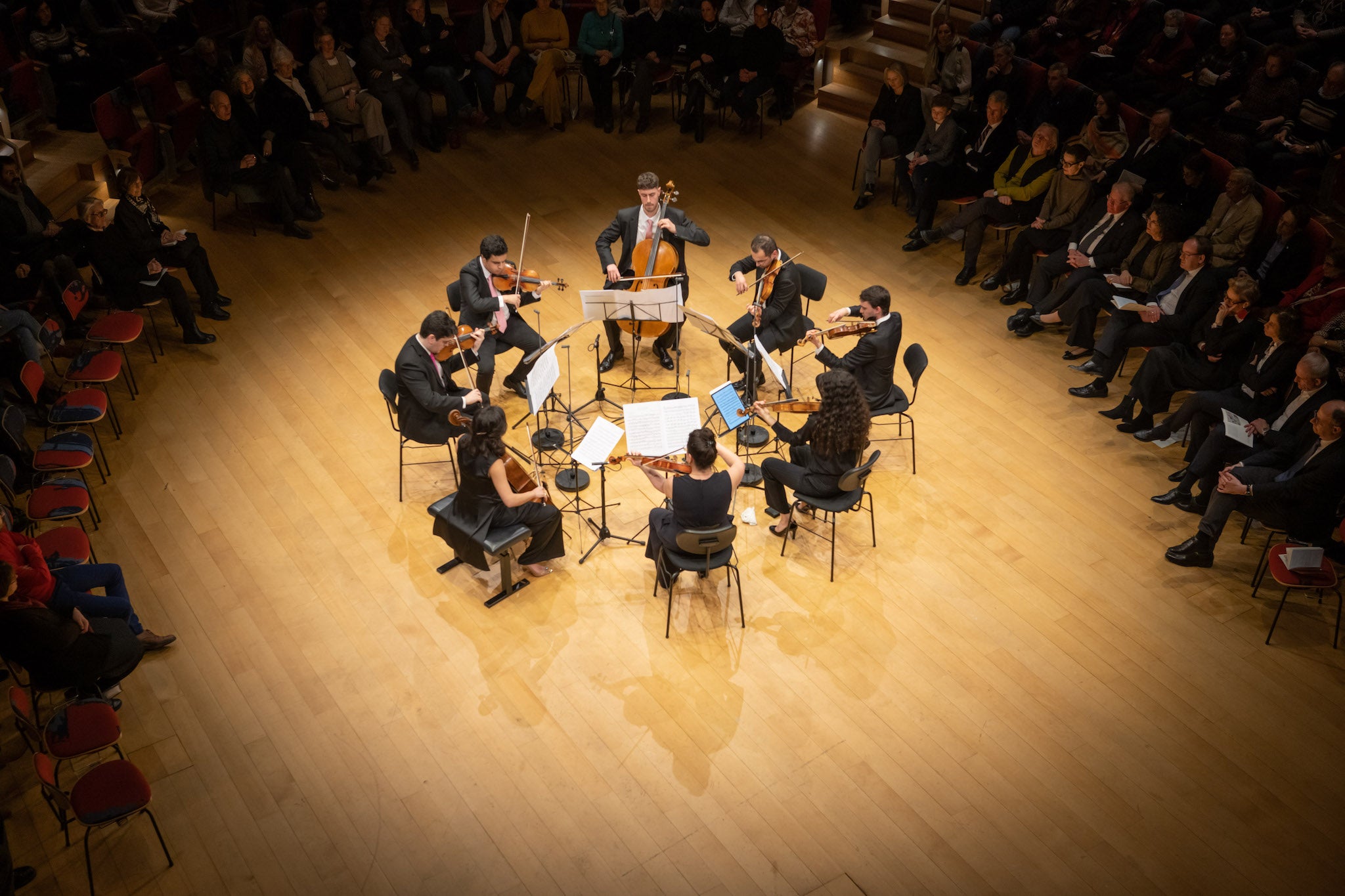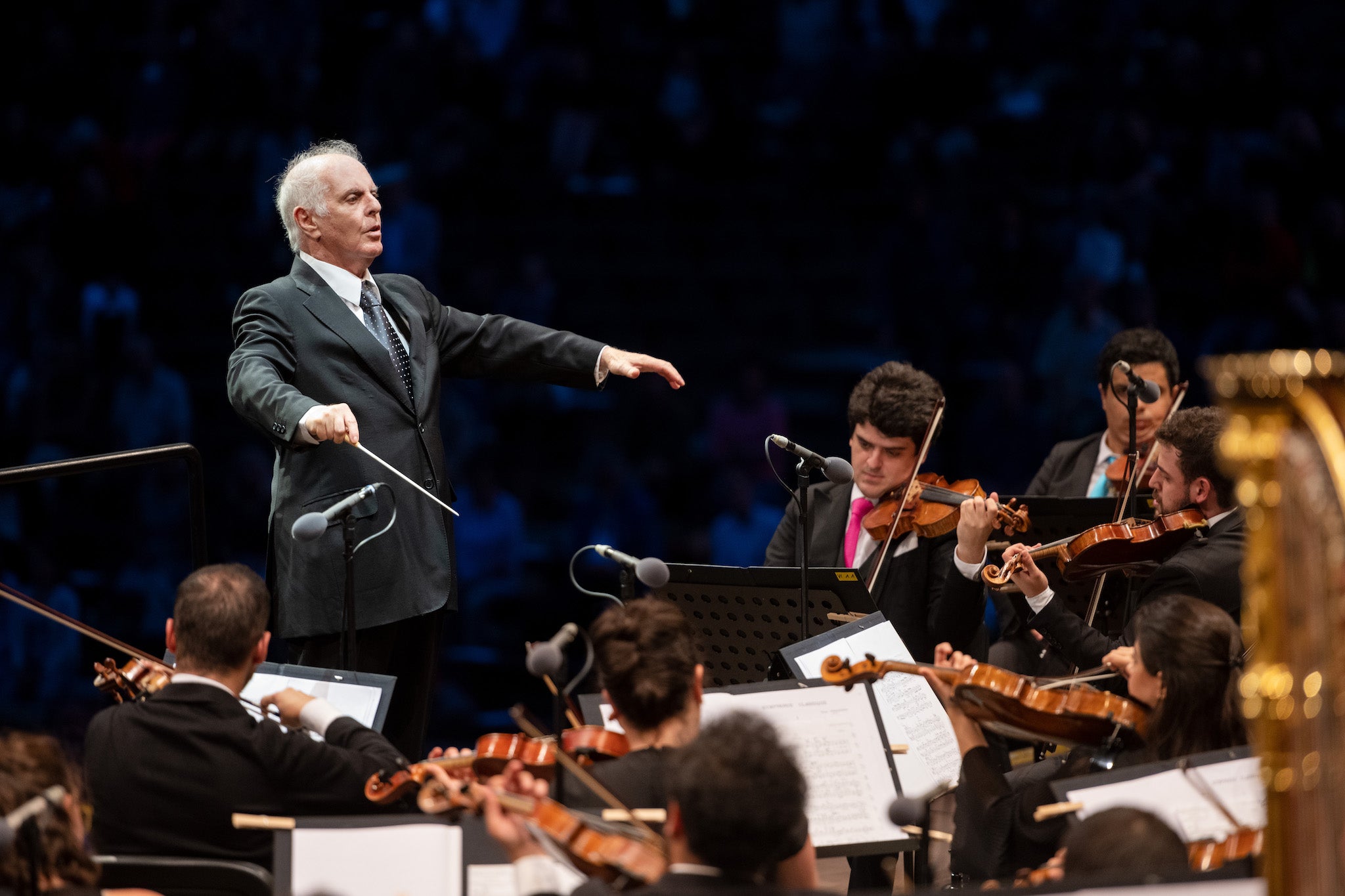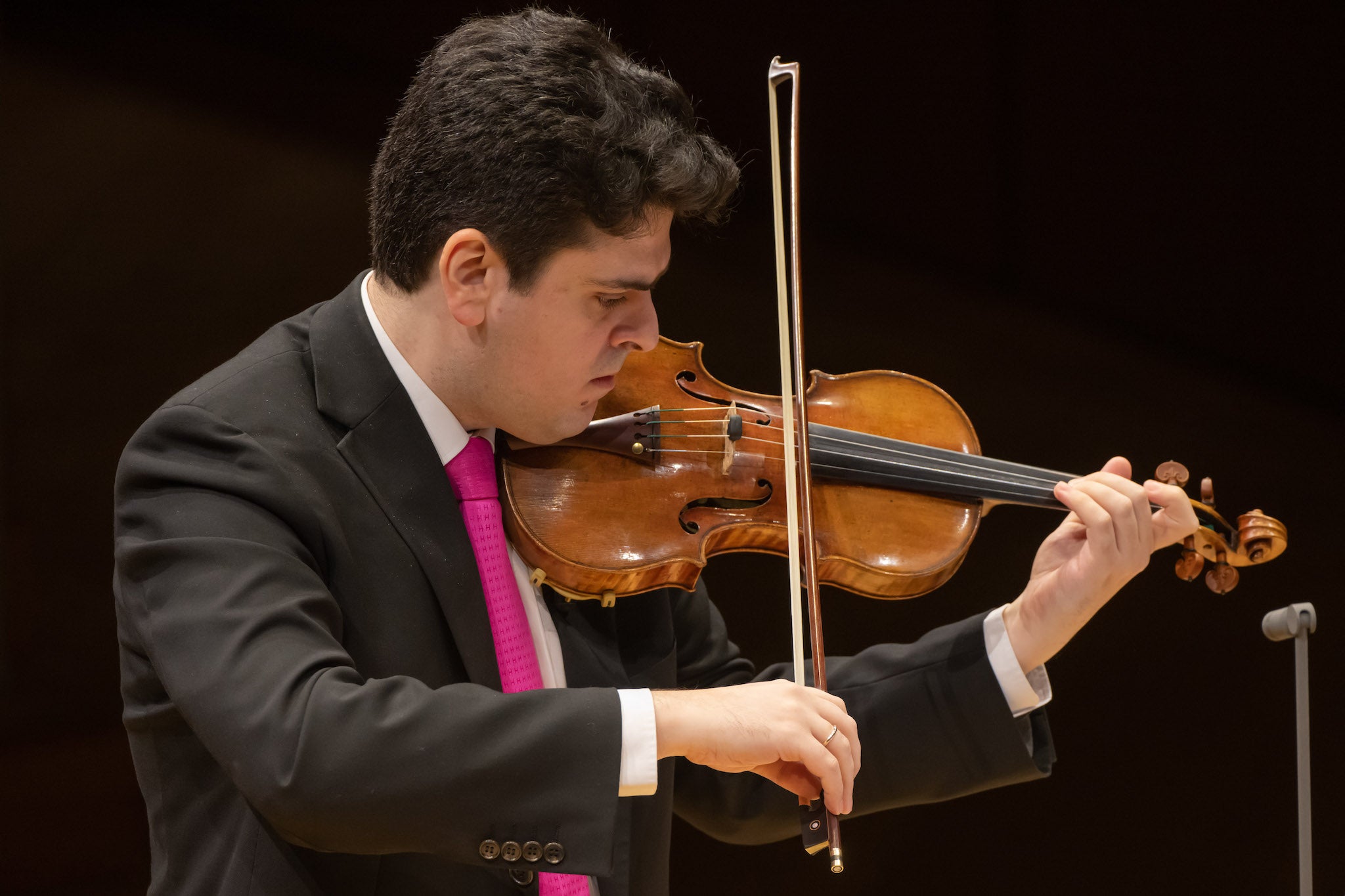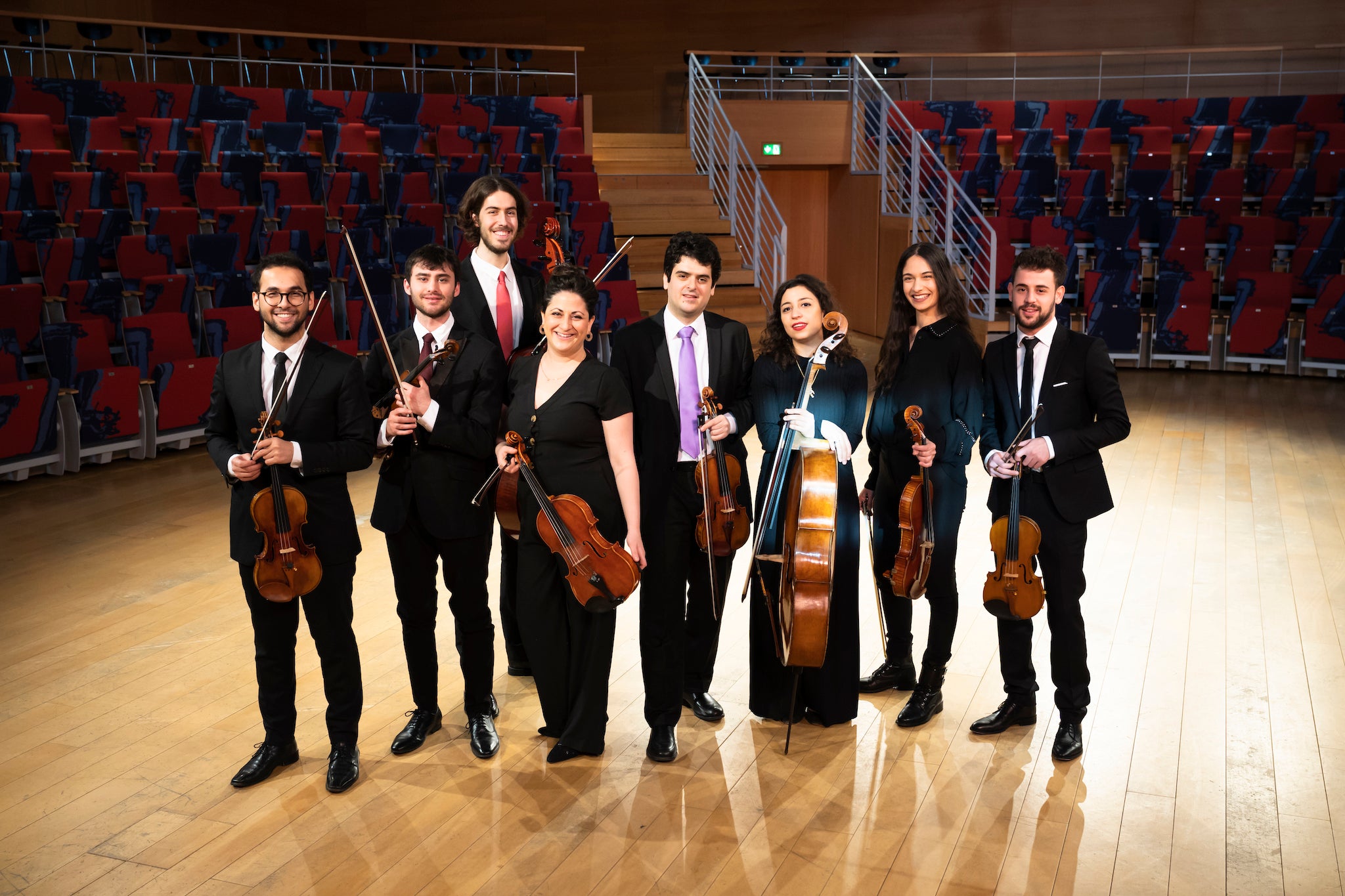In the West-Eastern Divan Orchestra, Israeli and Palestinian musicians play for peace
The young instrumentalists of Daniel Barenboim’s orchestra play music to show ‘another aspect of the Middle East... that we can be better than what you see on the news’. Ahead of next week’s concert in London, Michael Church talks to Barenboim’s violinist son Michael to reveal the orchestra’s defiant history and its hopes for the future

As the casualties climb and the divide between Israel and Palestine deepens, the question remains: how do the communities traumatised by the horrors of this past month find a way to live together?
One very unexpected ray of hope will be in evidence next Saturday at London’s Southbank Centre. An elite ensemble of young musicians from Israel and Palestine – led by violinist Michael Barenboim, son of Daniel Barenboim, whose vision this orchestra is – will give a chamber concert.
The West-Eastern Divan orchestra may have been formed in 1999, but the origins of their name, and the concept they embody, dates back to the early 19th century. “Divan” is the Persian word for “collection of poems”, and West-Eastern Divan was the title which German poet Johann Wolfgang von Goethe gave to his 1819 anthology of poems in the Persian style. When he wrote those poems he was exploring, with astonishing prescience, the cultural possibilities of cross-fertilisation between the so-called Orient and Occident. For most Germans in Goethe’s time, the Muslim world was the threatening outsider; the unknown “Other”. By learning Arabic and immersing himself in the work of the mediaeval Persian poet Hafiz, Goethe was proposing and pioneering a unique literary rapprochement.

And when, in 1999, Goethe’s adoptive city of Weimar wanted both to celebrate the 250th anniversary of his birth – and at the same time to celebrate its own apotheosis as the Cultural Capital of Europe. Daniel Barenboim, one of classical music’s deepest thinkers, was invited to devise a scheme, which might do both things in one fell swoop. His response to that invitation took everyone by surprise, and it launched the project whose latest flowering Londoners will be able to savour next week.
Barenboim had been aware that young musicians from Israel and the Arab countries had sometimes been brought together to play in music camps, but in tandem with his friend, the Palestinian writer Edward Said, he decided to establish a youth orchestra, which would travel under the same felicitous banner as Goethe’s anthology, and which would pursue a truly revolutionary goal. At a time when Israel had severed diplomatic links with Syria and Lebanon, and had strained relations with the rest of the Arab world, this orchestra would, he hoped, rope in players from the whole of the Middle East.
Two-hundred Arab music students applied to join the inaugural workshop, over which the cellist Yo-Yo Ma co-presided in Weimar; the resulting orchestra boasted players from Egyptian, Israeli, Palestinian, Jordanian, Lebanese, and Syrian backgrounds. Iran, as a non-Arab country with a problematic relationship to Israel, became an additional catchment area.
Barenboim has always resisted the facile label of an “orchestra for peace”, preferring insteadto describe it as an “orchestra against ignorance”. But doing something to dissolve the perennial conflict between Israelis and the Palestinians was his and Said’s dream from the start; after Said’s death in 2003, Barenboim carries the torch alone.
“I’m not trying to convert the Arab members of the Divan to the Israeli point of view,” he once told me in 2010. Nor was he seeking to win over the Israelis to the Arab perspective, “but I want to create a platform where the two sides can agree, and not resort to knives”. He had a neat explanation of why a symphony orchestra should be the perfect template for democracy: “When you play in an orchestra you have to express yourself, and simultaneously listen to what others are playing and saying.” Under this scheme, at each desk an Arab musician was to be placed next to an Israeli musician. More significantly, in the first half of every concert an Arab violinist would be the leader, with an Israeli violinist taking over after the interval, or vice versa.

But the road has never been easy. If the young players found it initially hard to settle on a common musical style, they found it much harder to sink their political differences – or as an Israeli player once put it, to “tear down the wall in our minds”. A turning point came when they visited the Nazi concentration camp of Buchenwald, after which a young Arab violinist observed that in the days of the Nazis, they would allhave been equal victims of racist persecution. The fact that the project has some Andalusian players, and that one of its bases is now in Seville – where Christians, Muslims, and Jewish people had co-existed peacefully – represents an additional glue. The orchestra has often allocated three chairs for Iranian musicians to play in concerts – a forlorn hope, perhaps, but one they will not give up.
Daniel Barenboim often stresses the orchestra’s purely musical achievements, as evidenced by its commercial recordings of Beethoven, Tchaikovsky, and Mozart – and by the fact that its graduates are now moving into top jobs in European orchestras. But his political message is always at the core of its work, whether in the simple fact of his own dual Israeli-Palestinian citizenship; his insistence on conducting Wagner with the Berlin Philharmonic – “a disgusting deed” thundered the Knesset Education Committee in 2021; or in his provocative speech to the Knesset when receiving one of Israel’s highest honours, the Wolf Prize, in 2004. “Can the state of Israel allow itself an unrealistic dream,” he had asked the assembled politicians, “of an ideological end to the conflict, instead of pursuing a pragmatic, humanitarian one based on social justice?” He provoked them further by giving his hundred thousand dollar prize-money to education projects in Ramallah, one of which was to research Arab folk music.
In 2005 Barenboim and the youth orchestra made a bold foray into Ramallah for a concert which they had to give under heavy military guard. This was a bold gesture on behalf of all the young people in the region, and after the performance concluded, Barenboim gave a speech: “It is our belief that the destinies of these two peoples, Israel and Palestine, are inextricably linked… Either we all kill each other, or we share what there is to share. It is this message that we have come here to bring.”
May our music bring us together, may it heal a little piece of our hearts. At the end of the day, all we can do is hope for peace, freedom, and the safety of everyone
Barenboim’s message of unity onlygrows more urgent with each year that passes, and it’s backed up by a conservatoire in Berlin – the Barenboim-Said Academy – which Barenboim founded in 2016, principally to help Arab musicians (who can’t afford private lessons) to raise their game to the level of their more privileged colleagues. But the academy also trawls further afield; many of its students are from Iran.
Barenboim, now 80, suffers from a neurological ailment, and his violinist son Michael – who joined the orchestra when he was 14 – has taken over his father’s role as orchestral leader and dean of the academy. As Michael puts it, the past month has been a supreme test of these young musicians’ resilience: the horrific events of the past weeks have left them too conflicted, and too anxious, to talk to the press. So how does he believe they are coping? “Each one deals with their problems in their own way, but we help them all we can,” says Michael. “We are there for them. Some just need to be alone, to think. Others desperately need company. But I never tire of saying this – this situation didn’t start on 7 October – it’s gone on for at least 50 years. We’ve long provided psychological support for those who need it, and we’ve obviously upped that support now.”

The academy students and the orchestra have put out a statement: “Our hearts are heavy; our minds are elsewhere with every single person affected by the devastating situation in Palestine and Israel. It is very difficult for many of us to be playing a concert right now. But even in this darkest hour, we will still follow in the footsteps of our founders, Daniel Barenboim and Edward Said. May our music bring us together, may it heal a little piece of our hearts. At the end of the day, all we can do is hope for peace, freedom, and the safety of everyone.”
What is Michael Barenboim’s hope for the future? “For Utopia, and it’s probably not going to happen in my lifetime,” he says. “I want the Divan to play in all the countries where its players are drawn from.” At present, he says ruefully, they perform everywhere else but there. He and his fellow musicians are excitedly looking forward to presenting a variegated and sparky programme at the Southbank. “The orchestra is showing another aspect of the Middle East. It’s showing that we can be better than what you see on the news,” he says. “The more visible we can be, the better.”
Michael Barenboim and the West-East Divan Ensemble perform in the Queen Elizabeth Hall on Saturday 11 November at 7.30pm






Join our commenting forum
Join thought-provoking conversations, follow other Independent readers and see their replies
Comments